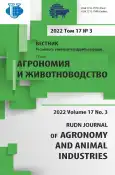Efficiency of early spring feeding of winter wheat complex fertilizers on light podzolic soil in Poland
- Authors: Blashik R.M.1, Nosov V.V.2, Peliy A.F.2
-
Affiliations:
- PhosAgro Polska Sp. z o.o
- Apatit company
- Issue: Vol 17, No 3 (2022)
- Pages: 299-314
- Section: Soil science and agrochemistry
- URL: https://journal-vniispk.ru/2312-797X/article/view/315628
- DOI: https://doi.org/10.22363/2312-797X-2022-17-3-299-314
- ID: 315628
Cite item
Full Text
Abstract
Field experiments were carried out on sandy loamy podzolic soil in the Łódź Voivodship (Wieluń commune, Masłowice parish) at the Experimental Station of the Polish Research Variety Testing Center, to study the effect of various winter wheat feeding systems with an intensive cultivation system on yield and grain quality indicators. The soil before conducting the experiments was characterized by a neutral reaction of the soil environment, a very high level of mobile phosphorus, and an average content of mobile potassium in 2017 and 2019, and high availability in 2018. The initial level of nitrate nitrogen in the soil was medium in 2017 and high in 2018 and 2019. The podzolic soils of the region, with a light granulometric composition, often have a low supply of sulfur available to plants. With a low content of humus in such soils, there is a small reserve of sulfur in organic form, and therefore, variants with sulfur-containing fertilizers were included in the intensive technology of winter wheat cultivation. Weather conditions of the growing seasons 2017-2018, 2018-2019 and 2019-2020 differed by an insufficient amount of atmospheric precipitation during the growth stages critical for grain formation. The yield of winter wheat grain in all years of research was maximum in variant 3 with the use of ammonium nitrate and complex sulfur-containing fertilizer Apaviva NPK(S) 15:15:15(10) as top dressing. The yield increase resulted from the autumn phosphorus-potassium application (double superphosphate and potassium chloride) was 25, 34 and 30 % in 2018, 2019 and 2020, respectively. The maximum grain yield of winter wheat in the experiment of 6.93 t/ha was obtained in variant 3 in 2019. Such a system of winter wheat top dressing provided a stable high additional income.
About the authors
Roman M. Blashik
PhosAgro Polska Sp. z o.o
Email: rblaszyk@phosagro.com
manager of the department of crop cultivation technologies 1 Rondo ONZ, 00-124, Warsaw, Poland
Vladimir V. Nosov
Apatit company
Email: VVNosov@phosagro.ru
SPIN-code: 4225-9307
Candidate of Biological Sciences, Head of the Competence center 55/1, Leninsky ave., Moscow, 119333, Russian Federation
Alexandr F. Peliy
Apatit company
Author for correspondence.
Email: APeliy@phosagro.ru
ORCID iD: 0000-0002-0717-7533
Leading Specialist, Сompetence center
55/1, Leninsky ave., Moscow, 119333, Russian FederationReferences
- Burlutsky VA, Peliy AF. Influence of agro-climatic conditions on the productivity of winter wheat in the conditions of Meshchovsky Opole. In: Mazurov VN. (ed.) Innovative development of agricultural sectors in the region: conference proceedings. Kaluga: Kaluga Research Institute of Agriculture; 2019. p.242—245. (In Russ.).
- Peliy AF, Nosov VV, Shatokhin AY, Grankina AO, Demidov DV, Sterkin MV. the use of a novel siliconcontaining agrochemical PhosAgro to winter wheat in the Non-Chernozem zone of Russia. International Agricultural Journal. 2021; (6):42—45. (In Russ.). doi: 10.24412/2587-6740-2021-6-42-45
- Aydiev AY, Lazarev VI, Kotelnikova MN. Improvement of cultivation technologies of winter wheat in Kursk region. Zemledelie. 2017; (1):37—39. (In Russ.).
- Tsimbalist NI, Aliev AM, Sychev VG. The cost structure of the use of fertilizers and chemical plant protection products in winter wheat (Triticum aestivum L.). cultivation technologies. Agrochemistry and ecology problems. 2018; (4):27—32. doi: 10.26105/AE.2018.4.94.006
- Solovichenko VD, Tyutyunov SI. Pochvennyi pokrov Belgorodskoi oblasti i ego ratsional’noe ispol’zovanie [Soil cover of the Belgorod region and its rational use]. Belgorod: Otchii dom publ.; 2013. (In Russ.).
- Shi R, Zhang Y, Chen X, Sun Q, Zhang F, Romheld V, et al. Influence of long-term nitrogen fertilization on micronutrient density in grain of winter wheat (Triticum aestivum L.). J Cereal Sci. 2010; 51(1):165—170. (In Chineese). doi: 1016/j.jcs.2009.11.008
- Polityko PM, Matjuta SV, Belenikin SV, Kapranov VN, Kiselev EF, Proshchenko AL, et al. Efficiency of cultivation technologies of winter wheat varieties (Triticum aestivum L.) originated by Moscow Research Institute of Agriculture «Nemchinovka» on gray forest soils. Agrochemistry and ecology problems. 2015; (2):15—21. (In Russ.).
- Lazarev VI, Maslova ZS, Shershneva OM. Agrobiological and economic substantiation of the use of complex fertilizers with micronutrients in the cultivation of winter wheat. Moscow Economic Journal. 2017; (3):12. Available from: https://qje.su/nauki-o-zemle/moskovskij-ekonomicheskij-zhurnal-3-2017-15/ (In Russ.).
- Orekhovskaya AA, Stupakov AG, Kulikova MA. Nitrogen regime of typical chernozem with long-term use of fertilizers and winter wheat yield. Scientific life. 2018; (12):93—101. (In Russ.).
- Stupakov AG, Smurov SI, Al Dhuhaibawi HK, Ziuba SN, Kulikova MA, Shiryaeva NV. Productivity of winter wheat under the influence of mineral fertilizers and precursors. Innovations in agricultural complex: problems and perspectives. 2020; 1(25):184—192. (In Russ.).
- Dolgopolova NV. Influence of mineral fertilizers on winter wheat wild resistance depending on methods of connection and terms of application. Vestnik of Kursk state agricultural academy. 2018; (1):23—26. (In Russ.).
- Solovichenko VD, Nikitin VV, Karabutov AP, Navolneva EV. The impact of crop rotation, methods of tillage and fertilizers on the yield and economic performance of winter wheat. Agrarian science. 2018; (5):46—49. (In Russ.).
- Cramer MD, Lewis OA. The influence of nitrate and ammonium nu-trition on the growth of wheat (Triticum aestivum) and maize (Zea mays) plants. Ann Bot. 1993; 72(4):359—365. doi: 10.1006/anbo.1993.1119
- Curci PL, Cigliano RA, Zuluaga DL, Janni M, Sanseverino W, Sonnante G. Transcriptomic response of durum wheat to nitrogen starvation. Scientific Reports. 2017; (7):1176. doi: 10.1038/s41598-017-01377-0
- Ma C, Liu YN, Liang L, Zhai BN, Zhang HQ, Wang ZH. Effects of combined application of chemical fertilizer and organic manure on wheat yield and leaching of residual nitrate–N in dryland soil. The Journal of Applied Ecology. 2018; 29(4):1240—1248. (In Chineese). doi: 10.13287/j.1001-9332.201804.023
Supplementary files










